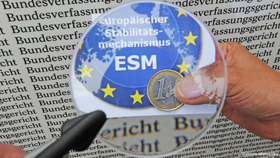The Eurozone – the Innovation Experiment is in Progress
(no votes) |
(0 votes) |
Deputy Director for Research at the Institute of Europe, Russian Academy of Sciences (IE RAS), Head of the Country Studies Department, Head of the Center for German Studies at the Institute of European Studies, Russian Academy of Sciences
The present crisis in the eurozone is caused in many respects by the political commitment of the movers of this ambitious experiment as well as by the lost opportunities of some of its members which have been participating in the structural reforming of their national economies in the 2000s. The measures taken today can prevent financial insolvency of the countries in the crisis and open the opportunities for them to implement the necessary reformative measures the results of which will be seen by us only over several years. Much depends on further improvement of the supranational regulation mechanisms as well as on Germany on whose economic potential the financial mechanisms created are based.
The present crisis in the eurozone is caused in many respects by the political commitment of the movers of this ambitious experiment as well as by the lost opportunities of some of its members which have been participating in the structural reforming of their national economies in the 2000s. The measures taken today can prevent financial insolvency of the countries in the crisis and open the opportunities for them to implement the necessary reformative measures the results of which will be seen by us only over several years. Much depends on further improvement of the supranational regulation mechanisms as well as on Germany on whose economic potential the financial mechanisms created are based.
Introduction of the common European currency in the late 1990s within the framework of the economic spaces of eleven EU countries – the members of the Economic and Monetary Union (EMU) may be compared with an innovative experiment. The innovativeness of the new monetary model consists in the offer to wave the right to one of the most important parts of the national sovereignty in the sphere of monetary and credit policy and to transfer it to the supranational body - the European Central Bank (ECB), the governing body of which is obliged to pursue the policy with regard to the common currency in conformity with the accepted rules and criteria.
An experiment is really an experiment, especially if it is carried out not on a laboratory scale but in the real-life environment of the world market. The model malfunctioned where it was obviously imperfect, namely - in the financial mechanisms of regulation.
The aspect connected with the experiment lies in the fact that the model has not been thoroughly estimated economically and grounded and, from the very beginning, has implied a point adjustment in the course of its practical approbation. Moreover, the movers have intentionally excluded from it a number of the major components which could not be implemented at that time for the reasons of policy. First and foremost, it was true and is as yet true of the unwillingness to reject the decentralized economic policy and to transfer gradually to the unified budgetary and tax policy of the EMU member countries.
Political commitment of the experiment
Only a competitive economy relying on the critical mass of small and medium-sized enterprises effectively competing with each other can provide employment opportunities, maintain domestic demand and export of goods/services and, in the long run, fill the state budget with necessary funds.
The political objectives and the guidelines of the governing body of the European Union have suppressed the critical judgements of the expert economic community, and the model has been marked by the political commitment from the very beginning [1]. The first years of the experiment led to admittance in the eurozone of Greece (in 2000) which obviously did not meet the basic requirements to the applicants. This was followed by the unwillingness to apply harsh sanctions to the violating countries. Ironically, the anchor members of the monetary union - Germany and France [2] - have turned out to be the first among them.
An experiment is really an experiment, especially if it is carried out not on a laboratory scale but in the real-life environment of the world market. The model malfunctioned where it was obviously imperfect, namely - in the financial mechanisms of regulation. The latent growth of debts of the countries having low indexes of the macroeconomic competitiveness has led, as the natural result, to the outburst over ten years. The actual financial position of the separate states and the eurozone as a whole has turned out to be not only dispiriting but also undermanaged. It has become apparent that the movers of the model have no instruments prepared in advance which might be used in case of occurrence of such outbreak. The results were inevitable discussions and down time. Owing to the political nature of the model, the time for carrying out profound structural reforms in the crisis countries has been wasted. While Germany, beginning from 2003, has managed to carry out correction of the mistakes, and quite effective and successful at that, Greece, Spain, Ireland, Portugal, Italy have not taken the advantage of such opportunities for various reasons. Some of the responsibility for such situation is born by the governing body of the eurozone and the EU (as a result of its non-interference in the 2000s). Absence of the sound economic base and the economic problems accumulated for many years prevent the market mechanisms from starting up in the crisis countries in the shortest possible time. The positive effects resulting from the specific reforms may be obtained only over the years.
One should not expect prompt results
The instruments - the European Financial Stability Fund, the European stability mechanism replacing it, the fiscal pact urgently developed by the European experts and approved by the national parliaments as well as the measures for control over the activities of the credit institutions in the eurozone countries suggested by the supranational regulator - are unable to solve the structural problems which underlie the present financial crisis. Only a competitive economy relying on the critical mass of small and medium-sized enterprises effectively competing with each other can provide employment opportunities, maintain domestic demand and export of goods/services and, in the long run, fill the state budget with necessary funds. External financial aid helps only to prevent a collapse and allows time for carrying out necessary economic and political reforms the most of which are not accepted by the electoral community owing to the understandable reasons. This is, probably, the fundamental problem of the crisis countries in the eurozone which have to pass between Scylla of financial collapse (the impossibility to service the external debt) and Charybdis of social and political outbreaks which will push aside the governments and delay implementation of the reforms.
It is necessary to preserve the present structure of the eurozone, to abandon admission of new countries (particularly from among the “younger members”) to it during the next three-five years and to continue the institutional reforms begun of the supranational regulation mechanisms, particularly in the sphere of the budgetary and a tax policy.
On this basis, the suggested recommendations have been worked out. One part of the expert community favors prompt removal of the weak links. Is there any use in waiting for the national ship to be crushed by these cliffs? Let it go to the bottom, but not within the framework of the eurozone. In other words, the sooner such countries leave the eurozone, the better for it. The other part of the experts believes that the side effects of such withdrawal are too great, the domino effect which implies that this way leads not to the recovery but to disintegration of the eurozone, i.e. to termination of the experiment, may not be excluded. There are also experts which choose the medium between these two positions. Strange as it may seem, all these points of view have the right to exist. There are no precedents in the history, and the outcome of the experiment remains an open question.
Overcoming the crisis by means of lesser evil
Notwithstanding rather good state of the German economy within the last three years and obvious improvement of the situation in sphere of the government finances, the electorate, the political opposition increasingly subject to relentless criticism the large-scale participation of Germany in the mechanisms of support of the crisis countries.
The following position is closer to me: it is necessary to preserve the present structure of the eurozone, to abandon admission of new countries (particularly from among the “younger members”) to it during the next three-five years and to continue the institutional reforms begun of the supranational regulation mechanisms, particularly in the sphere of the budgetary and a tax policy. It is reasonable to support carrying out these reforms by careful financial aid to the budgets of the crisis countries and by intense pressure upon their governments by way of coordination of the financial aid with continuing by them of their reform policy. In this connection, the additional financial load will fall no the advanced countries of the eurozone, primarily on Germany. It will be followed by compulsory issue operations on the part of the ECB connected with temporary intervention in the regulation of the financial situation by way of direct buying up of the government securities. The country inflation risks will increase. However, in my opinion, all of this in the aggregate is substantially lesser macroeconomic evil as compared to the unpredictability of the gradual or rapid collapse of the eurozone, which may turn out to be too heavy for the national budgets and the EU budget as a whole. As far as the first case is concerned, the situation may be better regulated, and even politically, and makes it possible to prevent occurrence of a new profound crisis, the probability of which is much higher within the framework of the second variant.
The potential of Germany is not limitless

A protester holds a copy of the German
Constitution at a demonstration against the
European Stability Mechanism (ESM) inKarlsruhe, Germany
Whatever is the scenario of the developments, the Federal Republic of Germany will continue to have the dominant role. At the present time, its political administration, first of all, represented by Bundeschancellor Angela Merkel and Minister of Finance Wolfgang Shoible, manages to have control over the situation. But it becomes more difficult for them to cope with this problem from month to month. Notwithstanding a rather good state of the German economy within the last three years and obvious improvement of the situation in sphere of the government finances, the electorate, the political opposition (both the systematic one and this within the governmental coalition) increasingly subject to relentless criticism the large-scale participation of Germany in the mechanisms of support of the crisis countries, fairly stating that there are objective limits of the national economy safety factor. In the middle of September, 2012 the Constitutional Court dismissed the collective complaint of the citizens and a number of the politicians against the decision of the Bundestag dated 29 June, 2012 regarding ratification of the agreement on the European stabilization mechanism (ESM) and the fiscal pact, thus having confirmed its legitimacy. The decision of the Constitutional Court lays special emphasis on the fact that the financial limit of the Germany’s obligations within the ESM amounts to 190 milliard euro, and its volume may not exceed 700 milliard euro. It is clear that in case of certain developments in the eurozone, it will turn out to be insufficient, which may lead to disruption of the social and economic and the financial stability of the Federal Republic of Germany. The radical variant of the protest discussion is the discussion concerning the necessity of exit from the eurozone and return to the Deutschemark.
Release of the fantastic thriller ‘Hour of an Eagle’ has been timed to the mentioned decision of the Constitutional Court [3]. Its author, Markus A. Vill, describes the struggle between the Deutschemark Party (DMP) which has come to power and wishes to withdraw Germany from the eurozone and the management of the Bundesbank which strives not to allow such developments. In their first comments on the book, German experts point out the content analysis of the possible economic consequences of such scenario (as well as the causes which may lead to it) and that the probability of its occurrence is far above zero.
The growing external pressure - not only on the part of the IMF but also on the part of a number of the eurozone partners (particularly South European ones) which demand easing of the ECB policy - is superimposed on the pressure of the internal opposition. Change in the position connected with buying up of the debts of its head Mario Dragi early in autumn of 2012 testifies to the fact that they are succeeding in achieving their objectives.
These are the conditions in which the election campaign for the future places in the Bundestag begins – the election to the lower chamber of the German Parliament will take place in September, 2013. The subject of the financial participation of Germany in support of euro (particularly, for the purposes of the current and the future national budgetary policy) will be one of the key subjects, and success of the Christian Democratic Union Party headed by A. Merkel turns out to depend substantially on developments in the eurozone.
The eurozone will be preserved
In conclusion, I will state my forecast with regard to the destiny of the experiment.
I am convinced that it will continue, and long enough at that (before it comes to the phase of the adequately functioning “product”). The eurozone will not cease existing as the project, in the worst possible case, it can lose one or two of its members. In the medium term, its expansion will not take place. The emphasis will be made on the supranational institutional reforms, particularly, in the fiscal sphere and on the structural reforms in all member countries. It will be the motivation and the precondition for entry into the eurozone of other countries of the European Union. Until the end of the current decade, Denmark, Hungary, Latvia, Lithuania, Poland and Czechia may be admitted to the eurozone. Euro will remain to be one of the world’s reserve currencies. The dynamics of its exchange rate with regard to dollar will be of sinusoidal nature as before. In the medium term, the currency band, most likely, will be within the range of 1,25-1,38 dollars for 1 euro. After a relatively long phase of weakening of euro in September, 2012, its strengthening has begun. This tendency will continue within six months at least. As the events of the recent years show, in the medium term and in the longer term, the exchange rate fluctuations will be determined not by the fundamental macroeconomic indicators but by short-term speculative expectations of the market makers.
The euro exchange rate with regard to rouble will be determined within the limits of the bi-currency basket movement and the macroeconomic position of the Central Bank of the Russian Federation. I think that by the end of the year – early next year it will be equal to 42-43 rubles for 1 euro.
1. Among the “guilty” of such commitment, some politicians in Germany (for example, Kurt Bidenkopf) name the former chancellor Helmut Kohl (the discussion concerning G. Kohl’s “guilt” is timed to the thirtieth anniversary of his accession to power). The critics of euro which have seen the fundamental imperfections of this currency model from its inception, including Joachim Shtarbatti, Wilhelm Nelling, Renate Or, Wilhelm Hankel, are active as usual.
2. See also one of the most interesting and informative articles concerned with the analysis of the underlying conditions of the crisis in the eurozone: Butorina O. The Crisis in the Euro Zone: Errors or Regularity?//Modern Europe. 2012. No. 2 (50). P. 82-94. (Буторина О. Кризис в зоне евро: ошибки или закономерность? // Современная Европа. 2012. № 2(50). С. 82–94.)
3. Markus A. Will. Die Stunde des Adlers. Finanzbuch Verlag, München, 2012.
(no votes) |
(0 votes) |






